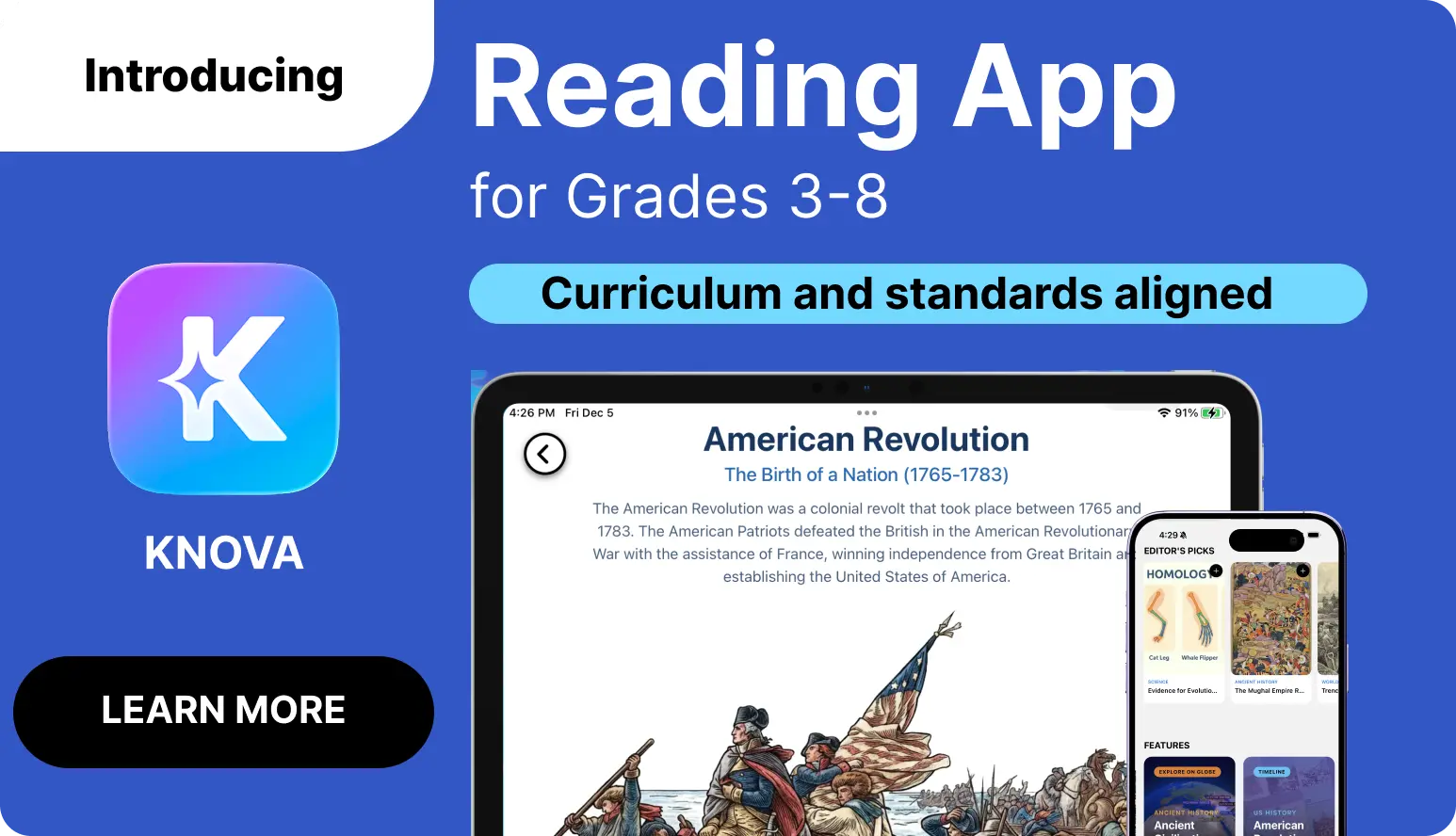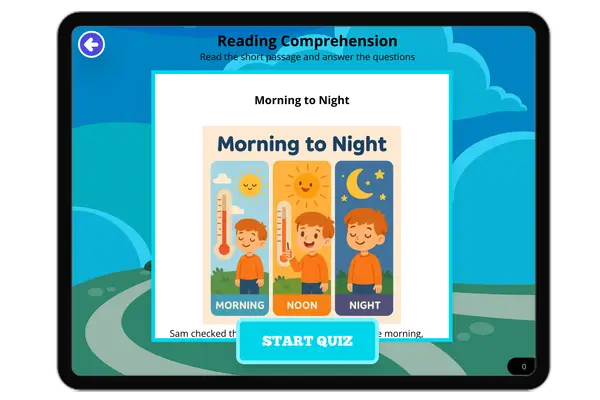The Solar System-Short Story
Join Mia on her science project journey through the solar system. Learn about the eight planets orbiting the Sun, their ...
RL.2.10RL.3.10RL.3.1RL.2.2
Earth Day and Types of Pollution
Earth Day is coming! Get ready to learn about pollution and test your knowledge. Click for a free reading passage and qu...
RI.4.1RI.4.2ESS3.CESS3.A
Earth Day and Green Initiatives
Celebrate Earth Day with this fun and educational activity! Students will begin by reading a short passage that explains...
RI.4.1RI.4.2ESS3.CESS3.A
Understanding Sunspots
Sunspots are fascinating dark patches on the Sun's surface caused by intense magnetic activity that lowers the temperatu...
Main causes of a heat dome?
Heat domes are caused by specific atmospheric patterns, primarily involving high-pressure systems. These high-pressure a...
RI.5.1
Natural Disaster: Droughts
Droughts are long periods with insufficient water, leading to crop failures and water shortages. Conserving water and pl...
RI.3.1RI.4.4RI.4.2RI.5.2
Natural Disaster: Blizzards
Blizzards are intense winter storms with strong winds and heavy snow. They can create dangerous conditions and require p...
RI.3.1RI.4.4RI.4.2RI.5.2
Climate Change and the Great Barrier Reef
This passage explores the profound impact of climate change on the Great Barrier Reef. It details how rising ocean tempe...
RI.3.2RI.4.2
Health Risks of Heat Domes
Heat domes pose significant health risks as our bodies struggle to maintain a safe temperature in extreme heat. Dehydrat...
RI.5.1
Natural Disaster: Earthquake
Earthquakes occur when tectonic plates move, causing the ground to shake. Understanding earthquakes helps us prepare and...
RI.3.1RI.4.4RI.4.2RI.5.2
Natural Disaster: Landslides
Landslides occur when masses of rock or debris move down a slope. They can cause massive destruction and can be triggere...
RI.3.1RI.4.4RI.4.2RI.5.2
The Milky Way - Our Galactic Home
The Milky Way is a massive spiral galaxy containing billions of stars, including our Sun. It features a central bulge, s...
RI.4.4RI.4.2
Natural Disaster: Volcanic Eruptions
Volcanoes can erupt with lava and ash, changing the landscape. While dangerous, they also create fertile land and new la...
RI.3.1RI.4.4RI.4.2RI.5.2
Natural Disaster: Tornadoes
Tornadoes are dangerous spinning columns of air. Knowing the signs and having safety plans can help protect you from the...
RI.3.1RI.4.4RI.4.2RI.5.2
Natural Disaster: Hurricanes
Hurricanes are massive storms with strong winds and rain. Tracking and preparing for them helps protect people in their ...
RI.3.1RI.4.4RI.4.2RI.5.2
Natural Disaster: Tsunamis
Tsunamis are massive waves caused by underwater disturbances. Early warnings and evacuation plans are crucial to saving ...
RI.3.1RI.4.4RI.4.2RI.5.2
Sunspots and Solar Flares
This quiz is designed to test your understanding of the fascinating phenomena of sunspots and solar flares, as described...
RI.4.1RI.4.4RI.5.1ESS1.A
Exploring Space: Rockets and Spacecraft
Space exploration has been one of humanity's greatest achievements, made possible by rockets and spacecraft. Rockets act...
RI.4.4RI.4.2
Andromeda - Our Galactic Neighbor
Andromeda, also known as Messier 31, is a massive spiral galaxy with about one trillion stars, located 2.5 million light...
RI.4.4RI.4.2
The Water Cycle
The water cycle describes how water continuously moves through our planet via evaporation, condensation, precipitation, ...
RI.4.4RI.4.2
The Nitrogen Cycle
The nitrogen cycle describes how nitrogen moves through the air, soil, and living organisms. It involves processes like ...
RI.4.4RI.4.2
Natural Disaster: Floods
Floods occur when excess water overflows onto land. Knowing how to prepare for and respond to floods can help protect pe...
RI.3.1RI.4.4RI.4.2RI.5.2
Natural Disaster: Wildfires
Wildfires spread quickly and can cause significant damage. Understanding fire safety and prevention is key to protecting...
RI.3.1RI.4.4RI.4.2RI.5.2
How might climate change affect animals?
This passage explains to children how climate change impacts animal life. It uses specific examples like polar bears los...
RI.3.1RI.4.14.ESS2.D4-ESS3
What can happen to sea levels because of climate change?
This passage explains to children how climate change leads to rising sea levels. It describes two main causes: melting i...
RI.3.1RI.4.14.ESS2.D
Reduce Your Carbon Footprint: Simple Tips for Home
This passage focuses on reducing carbon footprints at home by conserving electricity. It suggests practical actions like...
RI.3.1RI.4.14.ESS2.D4-ESS3
How using less plastic helps the environment?
This passage explains to children how reducing plastic use helps the environment. It outlines the life cycle of plastic,...
RI.3.1RI.4.14.ESS2.D4-ESS3
How Kids Can Help Fight Climate Change?
This passage introduces the concept of 'reduce, reuse, recycle' as a way for children to help fight climate change. It e...
RI.3.1RI.4.14.ESS2.D4-ESS3
Emma's Kite Day-Short Story
This engaging story captures the thrill of kite-flying on a windy day. Sisters Emma and May head to the park, where Emma...
RL.1.1RL.2.2
Sam’s Temperature Track
This passage supports NGSS K-ESS2-1 learning by tracking temperature changes throughout the day. Through simple observat...
ESS2-1RL.1.1
Farm Machines
This passage explores how agricultural technology aids food production. Students learn how machines make farming more ef...
Building Tools
This passage demonstrates how construction technology aids building projects. Students learn how different tools help wo...
Efforts to Save the Great Barrier Reef
This passage outlines various efforts to protect and preserve the Great Barrier Reef in the face of climate change. It d...
RI.3.8RI.4.8
How is Climate Different from Weather?
This passage distinguishes climate from weather for young readers. It defines climate as the usual weather patterns over...
RI.3.1RI.4.14.ESS2.D
Can you give an example of a renewable energy source?
This passage focuses on solar energy as an example of renewable energy for children. It explains how solar panels captur...
RI.3.1RI.4.14.4-ESS3
What is recycling, and why is it important?
This passage introduces the concept of recycling to children. It explains recycling as the process of turning used mater...
RI.3.1RI.4.14.ESS2.D4-ESS3
The Foggy Morning Mystery-Short Story
This intriguing story follows Emma and May as they venture into a fog-covered world. Emma explains the phenomenon of fog...
RL.1.1RL.2.2
Emma's Sunny Day Picnic-Short Story
This cheerful story chronicles Emma and May's sunny day picnic adventure. It emphasizes sun safety with Emma's reminder ...
RL.1.1RL.2.2
Ms. Park’s Garden Cleaners
This passage introduces ESS3.C concepts through practical garden activities. Students learn how daily choices impact the...
ESS3-CRL.1.1
Sam’s Fall Colors
This passage addresses pattern recognition in nature through seasonal leaf color changes. Students learn to observe, seq...
Bird Visits
This passage explores pattern recognition through bird watching activities. Students learn to identify and predict regul...
The Weather Station
This passage explores how different weather measurement tools form a complete system. Students learn how various instrum...
Weather Warning
This passage demonstrates how weather scientists help communities prepare for severe weather. Students learn about the i...
Desert Storms
This passage explores how different regions face specific weather challenges and how communities use forecasts to stay s...
Saving Energy
This passage demonstrates how daily choices affect the environment. Students learn about simple actions that help conser...
Weather Station
This passage demonstrates how weather monitoring technology helps protect communities. Students learn how different tool...





















































